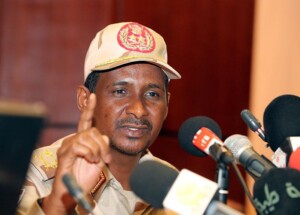Sudan PM Hamdok: Goal of the Road Forward Initiative is to unify revolutionary forces
Sudan’s Prime Minister Abdallah Hamdok has stressed that the main goal of the Road Forward Initiative is to unite all the forces that have interests in revolution and change in order to complete the transition, leading to the establishment of free and fair elections, and ensuring peaceful deliberation.
 Sudan's Prime Minister Abdallah Hamdok (File photo" SUNA)
Sudan's Prime Minister Abdallah Hamdok (File photo" SUNA)
Sudan’s Prime Minister Abdallah Hamdok has stressed that the main goal of the Road Forward Initiative is to unite all the forces that have interests in revolution and change in order to complete the transition, leading to the establishment of free and fair elections, and ensuring peaceful deliberation.
Addressing the first meeting of the Prime Minister’s initiative enforcement mechanism, he said that the mechanism is temporary and aims to accomplish specific tasks within two months. The PM stated that the initiative is not a new incubator and not a substitute for the Legislative Council or the Forces for Freedom and Change, but explained that the current crisis in the country is political.
The PM said that the members of the mechanism represent the entities that have approved the initiative but that tribal conflicts contributed to the complication of the selection process.
He said it was not in the interest to neglect parties in the initiative, and it is in the interest of the transitional period that all parties join through dialogue. He said that continuous consultations were held on the initiative with the Chairman of the Sovereignty Council and his deputy, who stressed the need to refer to the democratic transition and how to face the difficulties and issues of the transition and its enforcement.
Rasha Awad, a member of the mechanism, told a press conference after the meeting that the mechanism agreed to address the national crisis and transition issues and that it would address all reservations about the formation of the mechanism and taking them into account and contacting all parties to represent the parties that it believes were not represented.
She confirmed that the mechanism is not an executive body, but rather works on arranging, drawing out ideas and formulating them to help the executive body take the appropriate decision from the political and executive point of view. She explained that the mechanism added new axes to the seven axes, namely the axes of democratic transformation, peace, health, education, and women’s issues.
Resignations
The statements follow a tumultuous period with many resignations from the initiative.
Professor Hadia Hasaballah announced her resignation from the initiative, the fourth resignation after that of Darfur governor Minni Minawi and the eastern Sudanese native administration leaders from the Hendawa and Bani Amer tribes.
While the mechanism announced the formation of a committee to study the reasons for the resignations and to sit with the resigned members, Hadia Hasaballah explained on Facebook that she resigned over the committee’s composition, number, and percentage of women and youth representation. She explained further that the committee cannot achieve its central goals with such an unequal composition.
Shahinaz Jamal, a member of the Resistance Committees, also submitted her resignation from the initiative last week. She attributed her resignation to the fact that the list of members of the mechanism contained many names that she considered as 'part of the crisis', as well as some remnants of the former regime and opportunists.
She also criticised the fact that the members were not able to choose the composition and structure of the initiative's membership.











 and then
and then